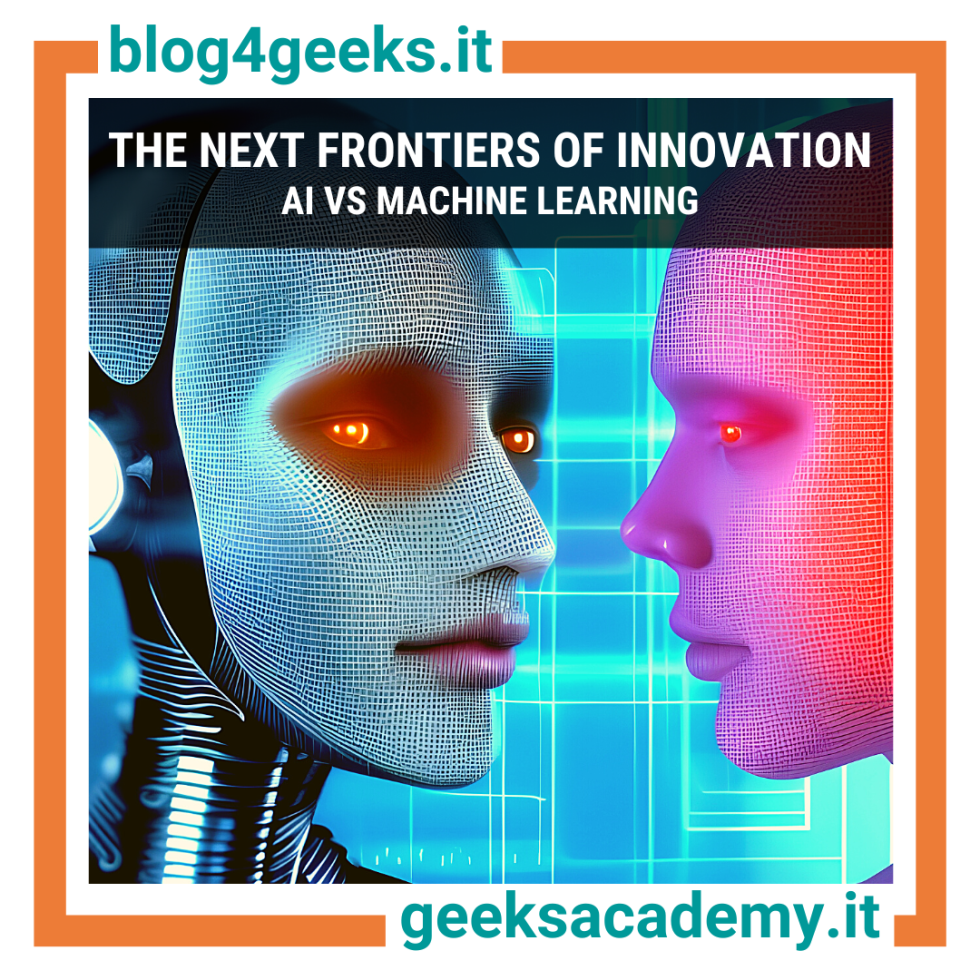
Discover Geeks Academy’s articles on: Blockchain, Coding, Cybersecurity, Cloud, Big Data, Artificial Intelligence, Gaming, Digital Innovation
With the success of artificial intelligence and AI generative tools, media interest in AI skyrocketed. However, it is a topic which creates so much confusion among readers and enthusiasts. The most frequently asked questions are indeed: what is artificial intelligence? What is machine learning? Are they actually the same thing?
Let's try to solve those doubts in a simple and intuitive way.
AI vs ML
The short answer is: artificial intelligence and machine learning are not the same.
Artificial intelligence (AI) is an area of computer science which focuses on building intelligent machines that can perform tasks that typically require human intelligence.
Recent developments in the field of AI are remarkable: advances in natural language processing (NLP) such as language models, including ChatGPT-3, with greater accuracy and understanding of context; developments regarding Generative Adversarial Networks (GAN) to synthesize realistic images, video and other media; improved computer vision techniques for object recognition and image classification; integration of artificial intelligence models with Internet of Things (IoT) devices to make home and work environments smarter.
These breakthroughs bring innovations in industries like healthcare, finance, transportation & mobility, customer service and so on.

Machine Learning (ML) is a branch of artificial intelligence that allows computers to learn from experience without being explicitly programmed. ML algorithms analyze data, learn from that data and then make a prediction about something.
Thus, ML is basically a method to implement AI.
Developments and innovations in machine learning inevitably intertwine with the aforementioned discoveries. Some of them are: advances in Deep Learning techniques, particularly convolutional neural networks (CNN) and recurrent neural networks (RNN), which improved the accuracy of image and speech recognition tasks; improved generative models, such as Variational Autoencoder (VAE) and Generative Adversarial Network (GAN), which can generate new data from existing data; improvements in reinforcement learning, specifically in games where artificial intelligence has outpaced human champions in complex games such as chess and Go; last but not least, greater efficiency and scalability of ML algorithms.
In short, artificial intelligence is a broad concept that refers to the development of computer systems capable of performing tasks that would normally require human intelligence. Machine learning is a specific approach to artificial intelligence that involves training computers to learn from data.
The future is AI
During the past years, the total amount of data created has soared, mostly due to the expansion of the Internet of Things (IoT). The data market is therefore growing dramatically and, according to the latest estimates, is going to reach a value of $103 billion by 2027. Here are some figures about the world of data:
- Businesses generate approximately 2,000,000,000,000,000,000 bytes of data per day.
- 97.2% of companies invest in AI and Big Data.
While the numbers speak for themselves, companies struggle to keep up with the ceaseless creation of new data:
- About 95% of companies report an inability to understand and manage unstructured data.
- Only about 26% of companies say they have achieved a data-driven culture.
Don't live the future as a sidekick... be a superhero! Discover Geeks Academy’s training offers in AI & Big Data:
Sources:
https://www.theverge.com/2019/11/27/20985260/ai-go-alphago-lee-se-dol-retired-deepmind-defeat
https://www.amii.ca/latest-from-amii/future-ai-reinforcement-learning-and-heres-why/
https://towardsdatascience.com/gans-vs-autoencoders-comparison-of-deep-generative-models-985cf15936ea